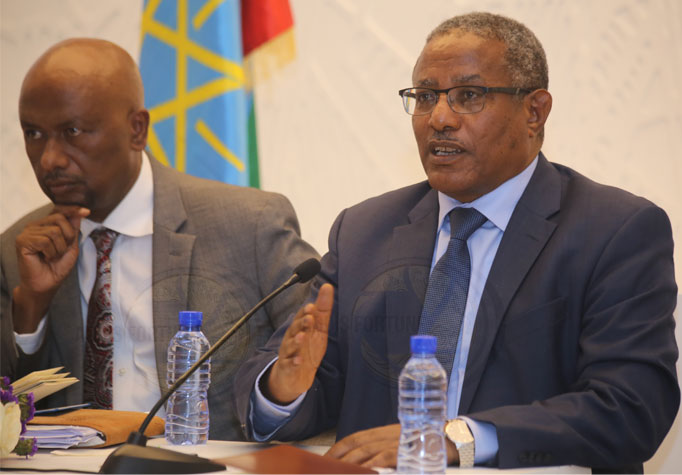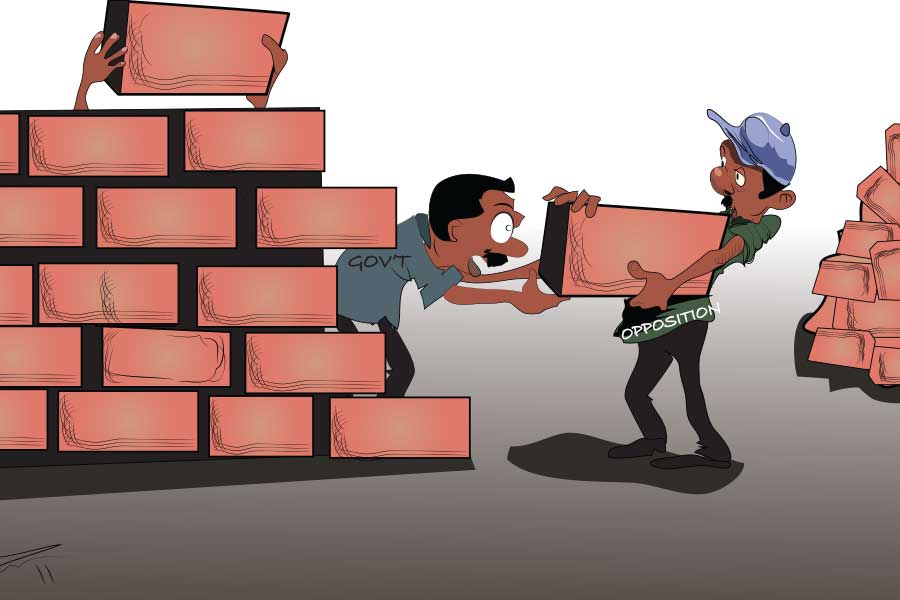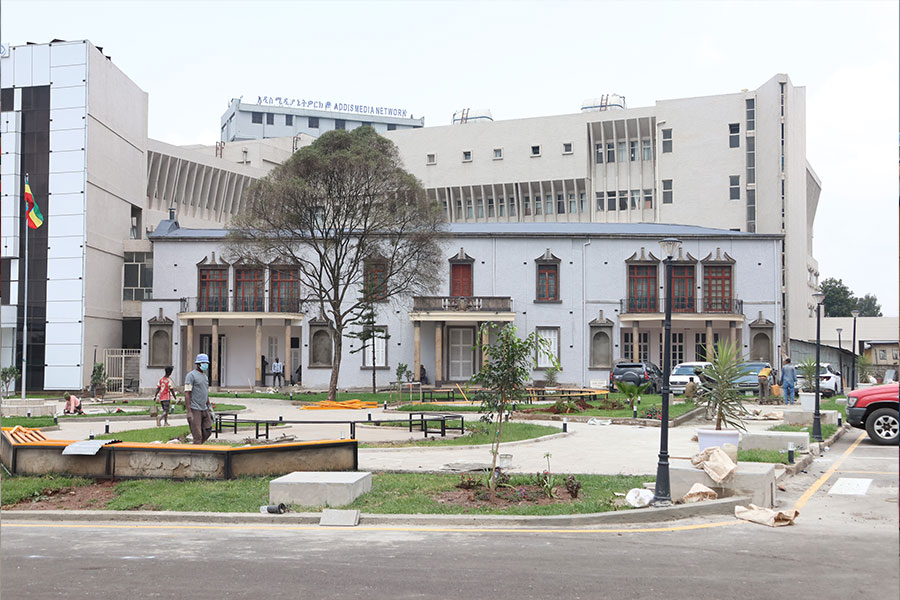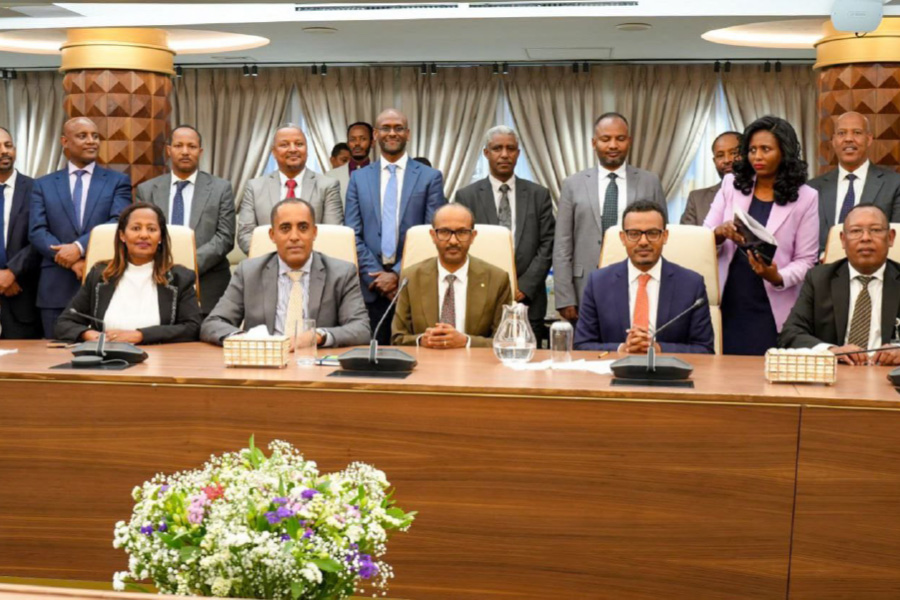
Fortune News | Mar 03,2020
May 23 , 2020
By Dejen Yemane
The foreign policy and international relations of Ethiopia with Egypt are unavoidably dissimilar to the hundreds of countries around the world. The North African country is one of Ethiopia's longest-standing and most complicated diplomatic relationships.
More often than not, this relationship is antagonistic, which is mainly a result of the disagreements over the use and ownership of the Nile. The river mostly hails from Ethiopia, but it has been much more critical to Egypt’s civilization. By that logic, the country has claimed ownership of the Nile.
Egypt’s diplomatic approach on the Nile has been coercive and speculative. Maintaining the status quo of its hydro-hegemony is at the centrepiece of its Nile diplomacy.
For Ethiopia, winning this diplomatic battle is critical to its economy and its geopolitical standing. But, if recent diplomatic efforts are anything to go by, there is a great deal we need to be worried about.
The moment we sat down for discussions on the Grand Ethiopian Renaissance Dam (GERD) with Egypt, we showed our diplomatic imprudence, and Egypt got away with manipulating us until it was almost too late. As the owner of the dam, we were not obliged to hold negotiations, regardless of Egypt’s complaints.
Egypt’s only claim to ownership is the colonial-era agreements. The country’s refusal to sign the Nile Basin Cooperative Framework due to its demand for historic and natural rights over the Nile waters was sufficient reason for Ethiopia to refuse its call to negotiate on the GERD.
It was Ethiopia’s diplomatic imprudence that paved the way for the current diplomatic trajectory. The 2015 agreement on the declaration of principles opened the diplomatic Pandora's Box and the deadlock with Egypt.
The biggest mistake we brought upon ourselves is, however, agreeing to sit down with Egypt and Sudan for a negotiation that was to be hosted by the United States and the World Bank.
The main questions that could have been raised were why Egypt looked to the United States for mediation? Why look for mediation before negotiations at the national technical committee level were completed? What would be the effects of failing to reach a deal? What interests does the United States have on the negotiation? How close are Egypt and the United States, and how is the former critical to the latter’s geopolitical aspirations?
The government rushed into the US-brokered negotiation without raising and addressing these questions. Once in this position, there was still the possibility of withdrawing as there were indications that the United States was on Egypt’s side of the issue. It was only at the 11th hour that the government decided to skip the last meeting, which the United States had hoped would lead to the signing of a deal.
It was a gamble with the national interest for the government to have put itself in this place, and not have held consultations, or skipped the last meeting, without significant public outcry.
Throughout this process, Egypt has had one constant position. Its intention was to sign a trilateral agreement that reaffirms its 20th-century water hydro-hegemony. This last-minute change of mind by Ethiopia to skip the negotiations has not hampered Egypt,
It recently took its tactics up a notch and took the matter to the United Nations Security Council, which has primary responsibility for the maintenance of international peace and security. China, the United States, Russia, Britain and France are the veto decision making powers at this organ of the United Nations. Our problems have been taken from Washington to New York City, the headquarters of the United Nations.
Had the government been vigilant in protecting Ethiopia’s national interest, it would not be in the place it is now. The GERD is a unilateral project built on the Blue Nile River, which originates and flows from Ethiopia’s highlands. Both Egypt and Sudan built several dams over the Nile, but they never consulted Ethiopia, nor discussed the filling or operation of their dams. Ours should not be an exception. We must proceed to fill and to operate the dam despite any foreseen or unforeseen outcome from anybody.
The government is now determined to commence filling the dam by July. This should continue. We should not make any more concessions, and neither should it accept any deal thrown at it from Egypt, at least not without public consultations. As for the Security Council, it should be noted that there is no international law that can be invoked to prohibit Ethiopia from using its own water resources.
It is time for the Ethiopian government to redeem the imprudent diplomatic path it took earlier on the issue of the GERD.
PUBLISHED ON
May 23,2020 [ VOL
21 , NO
1047]


Fortune News | Mar 03,2020

Editorial | Aug 31,2019

Featured | Nov 12,2022

Editorial | Aug 27,2022

In-Picture | Jul 06,2025

Editorial | May 28,2022

Fortune News | Nov 03,2024

Editorial | Jul 25,2020

Editorial | Nov 06,2021

Featured | Oct 25,2020

Photo Gallery | 179714 Views | May 06,2019

Photo Gallery | 169911 Views | Apr 26,2019

Photo Gallery | 160865 Views | Oct 06,2021

My Opinion | 137199 Views | Aug 14,2021

Dec 22 , 2024 . By TIZITA SHEWAFERAW
Charged with transforming colossal state-owned enterprises into modern and competitiv...

Aug 18 , 2024 . By AKSAH ITALO
Although predictable Yonas Zerihun's job in the ride-hailing service is not immune to...

Jul 28 , 2024 . By TIZITA SHEWAFERAW
Unhabitual, perhaps too many, Samuel Gebreyohannes, 38, used to occasionally enjoy a couple of beers at breakfast. However, he recently swit...

Jul 13 , 2024 . By AKSAH ITALO
Investors who rely on tractors, trucks, and field vehicles for commuting, transporting commodities, and f...

Nov 1 , 2025
The National Bank of Ethiopia (NBE) issued a statement two weeks ago that appeared to...

Oct 25 , 2025
The regulatory machinery is on overdrive. In only two years, no fewer than 35 new pro...

Oct 18 , 2025
The political establishment, notably the ruling party and its top brass, has become p...

Oct 11 , 2025
Ladislas Farago, a roving Associated Press (AP) correspondent, arrived in Ethiopia in...

Nov 2 , 2025
The National Bank of Ethiopia (NBE) has scrapped the credit-growth ceiling that had s...

Nov 2 , 2025 . By SURAFEL MULUGETA
The burgeoning data mining industry is struggling with mounting concerns following th...

Nov 2 , 2025 . By YITBAREK GETACHEW
Berhan Bank has chosen a different route in its pursuit of a new headquarters, opting for a transitional building instea...

Nov 2 , 2025 . By BEZAWIT HULUAGER
Nib International Bank S.C. has found itself at the epicentre of a severe governance...